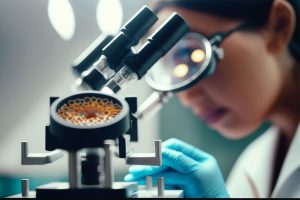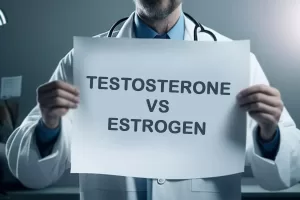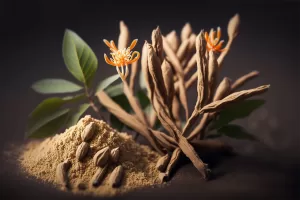Coffee is one of the most consumed beverages in the world with total production of about 170 million bags per year. We know that caffeine—the main active chemical in coffee—affects one’s health. But are the consumption of coffee and testosterone levels connected? Will coffee help you battle your testosterone deficit or make it worse?
When in doubt, ask for evidence-based science. PubMed and Google Scholar never fail to provide accurate and unbiased information that we used to write this article.
What is Testosterone
Testosterone, or T for short, is a sex hormone. Its importance for the health of AMAB people led to its classification as an androgen (male) hormone, although it is present and active in women’s bodies as well.
Importance of testosterone
T is necessary for proper pubic development, bone strength, erythrocyte production in bone marrow, and many sexual functions (libido, erection, fertility). It takes part in metabolism, promoting fat burning and muscle growth. Sufficient T levels also help maintain an optimistic and energetic mood, be strong, and keep good stamina and endurance.
Factors that can influence T levels
When T levels are too low, the condition is called testosterone deficiency (TD), or hypogonadism. It can be caused by various factors and conditions:
- Anorchia—an occurrence when an AMAB person has been born without testicles.
- Cryptorchidism—a condition of testicles not having descended.
- Improper Leydig cell development.
- Orchiectomy (testicle amputation) or other physical damage to the testicles, such as traumas.
- Orchitis, testicle inflammation that can be caused by various infections.
- Tumors of a specific kind.
- Chemotherapy, radiation emission.
- Abuse of steroid anabolics.
- Untreated type 2 diabetes.
- Liver cirrhosis.
- Kidney failure.
- Head (brain) traumas and injuries.
- Certain medications, such as those for prostate cancer treatment.
- Obesity.
- Stress.
- Drinking.
- Smoking.
- Sedentary lifestyle.
- Old age (TD affects as little as 1% of males in their 20s–30s and 50% in men over 80).
Impact of Coffee on Testosterone Levels
As of today, science does not have a finalized point of view on caffeine consumption regarding testosterone. While some studies report a positive caffeine effect on testosterone, others claim the opposite.
For example, there is an article under DOI 10.1186/s12937-022-00783-z, published in the Nutrition Journal in May 2022. The authors used data from a cross-sectional study of 372 adult male participants of the 2013-2014 NHANES survey cycle. Their goal was to determine if there is a connection between serum testosterone levels, caffeine, and 14 caffeine metabolites. They concluded that coffee can contribute to the development of TD, although a biochemical mechanism was not established.
There was also a study published in The Journal of Basic and Clinical Physiology and Pharmacology in September 2016. The researchers treated adult male Wistar rats with caffeine for 4 weeks. The authors reported body and reproductive organs’ impairment, low sperm count and LH levels, and negative changes in testicular cytoarchitecture.
On the other hand, there is a 2019 study conducted on a scopolamine-induced model of amnesia in rats. According to it, dosages of 5 and 25 mg/kg of caffeine increased testosterone levels, modulated steroidogenic enzyme activities, and improved sperm quality.
Getting back from mice to human studies. In 2010, a controlled clinical study with competitive male cyclists who were given caffeinated chewing gum revealed a 12 ± 14% increase in saliva testosterone in comparison with the placebo. Another study, a randomized controlled trial, had 24 professional rugby-league players ingesting caffeine doses of 0, 200, 400, and 800 mg in random order 1 hr before a resistance-exercise session. They showed a 15% increase in T concentration.
Does this say that coffee can boost testosterone? Not necessarily. While increasing T levels, caffeine also boosted the concentration of cortisol which inhibits testosterone production. Two effects can easily balance each other out. Moreover, there were reports that caffeine could raise levels of the sex hormone-binding globulin (SHBG)—a blood protein that binds T molecules making them biounavailable.
To complicate matters, there is work by David S. Lopez and his colleagues who performed a cross-sectional study and analyzed data for 2581 men (≥20 years old) who participated in the cycles of the NHANES 1999-2004 and 2011-2012. They found no linear association between levels of caffeine consumption and testosterone in AMAB people of America. They reported a non-linear association, though, including among racial/ethnic groups and measurements of adiposity but claimed that further research is necessary.
So, will coffee increase testosterone? Even if it might, the effect could be leveled out by elevated cortisol and SHBG, and coffee is certainly not a treatment method for TD. It is also important to remember that everyone is an individual. Such factors as age, weight, overall health, and amount of physical activity will greatly affect the way our bodies respond to one or another stimulant.
If you wonder, what effect will have your daily cup of black coffee on testosterone, do not worry and enjoy your drink in peace. Unless you are addicted and consume too much, you will be fine, and coffee will actually prove quite beneficial for you.
Biochemistry of Coffee
The main bioactive compound of coffee is caffeine. It is classified as a plant alkaloid and affects the renal, respiratory, and cardiovascular systems and smooth muscle. It also has an impact on alertness, physical and cognitive performance, mood, and memory.
How caffeine works in the body
From a pharmacological point of view, caffeine is a very active compound that is able to:
- inhibit adenosine receptors;
- inhibit phosphodiesterase enzymes in skeletal muscle and adipose tissues;
- supposedly, affect ionic calcium, especially in skeletal muscle and brain.
Nervous system and metabolism
Caffeine causes numerous different effects:
- In the lungs, it causes bronchial dilatation and relaxation of the smooth muscle, causing an antiasthmatic effect. this combines well with the stimulation of the brain’s respiratory center caused by the substance.
- In kidneys, caffeine stimulates blood flow and increases diuresis.
- Although caffeine is associated with elevated blood pressure and tachycardia, 2 to 5 cups of coffee daily can be linked to lower risks of cardiovascular disease.
- Caffeine increases basal metabolic rate, muscle strength, and overall physical performance.
However, most widely caffeine is used as a CNS stimulant. It stimulates dopamine, norepinephrine, serotonin, acetylcholine, glutamate, and GABA neurons, creating a synergistic effect with these chemicals and improving mental functions. It reduces fatigue and drowsiness, improves alertness, perception, reaction time, and motor skills, and promotes good mood and easy task switching.
Other Drinks That Contain Caffeine
Coffee is not the only drink you can get caffeine from. Various kinds of tea (black, green, pu’er, oolong, etc.), mate, Cola, and energy drinks also contain caffeine.
How Other Ingredients in Coffee May Affect Testosterone
Caffeine is not the only bioactive compound in coffee. There are also polyphenols called chlorogenic acids, trigonelline, melanoidins, diterpenes, such as cafestol and kahweol, and other phytochemicals. The exact chemical composition of the drink depends on many factors, starting from the kind of coffee beans to conditions of the growth and infusion method.
More important is that these compounds cause quite powerful antioxidant and anti-inflammatory effects. They can reduce oxidative stress on tissues and cell mutations, inhibiting aging and cancerous formations. Thanks to this, organs and tissues, including those of the reproductive system, remain functioning at a good rate.
Moreover, the studies confirmed that coffee can inhibit aromatase—a chemical responsible for the androgen transformation into estrogens. The combination of these two factors makes coffee beneficial for T levels in the body.
Coffee, Testosterone, and Exercise
As we already know, caffeine enhances physical performance. You can also notice that in studies, an increase in T levels was the most noticeable in athletes. And working out also promotes testosterone production. This allows us to conclude that coffee consumption can make gym sessions more effective in terms of T production improvement.
How much coffee is too much?
For a healthy adult, a safe caffeine intake is about 400 mg per day. Depending on what coffee drink one prefers, it equals 2–5 cups.
Role of Lifestyle in Testosterone Levels
You can naturally boost your T production and increase its level without supplementation or hormone replacement therapy. A wholesome lifestyle is a proven method for getting a good hormone balance. Main factors to focus on:
- Sleeping;
- Eating healthy foods rich with nutrients.
- Staing physically active.
- Getting rid of bad habits, such as drinking and smoking.
- Stress management.
Summary
Research shows mixed evidence on the impact of coffee on testosterone. It appears to be inconsistent and connected to many other factors. While coffee consumption may have a beneficial effect on testosterone, it cannot be an effective method for TD management.
FAQ
How much caffeine affects testosterone?
Various studies suggest various dosages of up to 800 mg. However, one should remember that safe caffeine consumption cannot exceed 400 mg per day for a healthy adult person.
Does caffeine help with low testosterone?
It is possible; study results are mixed and inconsistent. Therefore, caffeine cannot be considered a good method to treat TD.
What drinks boost testosterone?
Those individuals who respond well to caffeine can get a boost in T levels from coffee, tea, and mate. However, it depends on many factors and the effect is purely individual and unpredictable.
Which foods increase testosterone the most?
Raw onion, garlic, green vegetables, oysters and seafood, banana, olive oil, pomegranates, honey, and ginger are known to be able to improve T levels.







